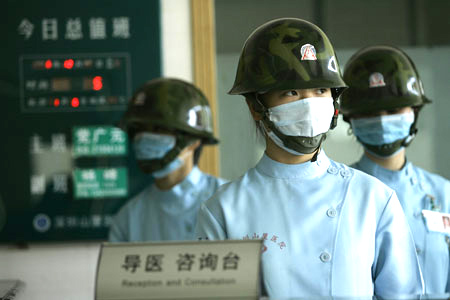| Home / Government / Gov't Briefings | Tools: Save | Print | E-mail | Most Read |
| Put Police in Hospitals, MOH Says |
| Adjust font size: |
Police officers should be stationed in hospitals across the country to help keep the peace and avert the need for medical staff to wear protective clothing while they are trying to save lives, a spokesman for the Ministry of Health (MOH) said yesterday.
"Bringing about a harmonious medical service environment is not just down to the hospitals," MOH spokesman Mao Qun'an said when asked to comment on a nationwide rise in the number of medical disputes, which occasionally turn violent. "The police should be more involved in safeguarding hospital staff and the facility itself," he said, calling for a joint effort to halt the violent trend and provide a better service for patients. According to MOH figures, in 2006, 9,831 attacks stemming from medical disputes caused more than 200 million yuan (about US$26 million) worth of damage to hospital property. In the same year, more than 5,500 medical personnel were injured in attacks by patients or their relatives as a result of disputes. The situation reached a critical level at the end of last year, when employees at a Guangdong hospital were forced to wear safety helmets to protect themselves from attack by a group of people who felt they had been wrongly treated. During the incident, the mob smashed medical equipment, burned papers and candles (a traditional Chinese way to remember the dead), and left a dead body in a public area of the hospital for several days, the Xinhua News Agency reported at the time. "Such extreme events, which damage patient-doctor relationships and disrupt the day-to-day running of hospitals, could be prevented if all concerned parties, including the police, worked together," Mao said. Partly in response to cries from hospital staff for more protection, Wuyishan in the eastern part of east China's Fujian Province, last month stationed police officers in 14 of its hospitals. They were charged primarily with resolving medical disputes and handling unrest, a Xinhua story said, as well as maintaining order and preventing theft. Inspired by Wuyishan's lead, several other hospitals across the country have since followed suit. Vice-minister of Health Chen Xiaohong recently ordered all medical institutions to map out emergency plans for dealing with medical disputes. (China Daily May 11, 2007) |
| Tools: Save | Print | E-mail | Most Read |
| Related Stories |
|
||||||||||||
|
| Links | |||||||||||
|
